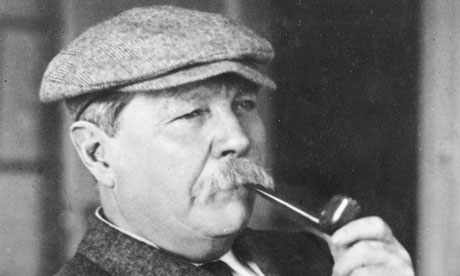By Carl Holliday.
The Century Co.
1912.
Chapter VIII: Pages 388-389.
In inventive power and ingenuity few men of the nineteenth or twentieth century have excelled Sir Arthur Conan Doyle, author of the famous Sherlock Holmes stories. It is reported that Doyle is sometimes chagrined that he should be more noted for these detective tales than for his more deep and serious productions, such as 'A Study in Scarlet', 'The Sign of the Four', 'The White Company', and 'The Great Shadow'; but it is nevertheless probable that his most lasting fame will be based on those tales of intrigue and shrewd scheming, 'The Adventures of Sherlock Holmes', 'The Memoirs of Sherlock Holmes', and 'The Return of Sherlock Holmes'. In spite of the doctor-novelist's efforts to kill off the astute detective, the people will not let the hero die, but call again and again for his return.
Doyle, like Dumas, owes much to Poe in this business of making and solving riddles. There may not be any great amount of the philosophy of life in such efforts; the author may not have opportunities to show a varied delineation of characters; but that supreme skill and great technical art may be displayed in such work has been proved by both Poe and Doyle. And it should be remembered that this continued study of one hero may result in a character of permanent literary value. Sherlock Holmes is to-day as living a personality to hundreds of thousands of readers as Pickwick or Becky Sharp. Moreover, this vivid relating of but one episode at a time in the character's life makes the narrative a perfect specimen of the short story, a type that differentiates itself rather strictly from the novel, not by its shortness, but by the fact that it reviews only one of the critical moments in a life. Conan Doyle in his conciseness, his vividness, his logical, closely woven plots, his use of the mysterious, his ingenious solutions, and his knowledge of what to leave out, will probably long be considered a master of the short-story form.
Category: Detective fiction

No comments:
Post a Comment